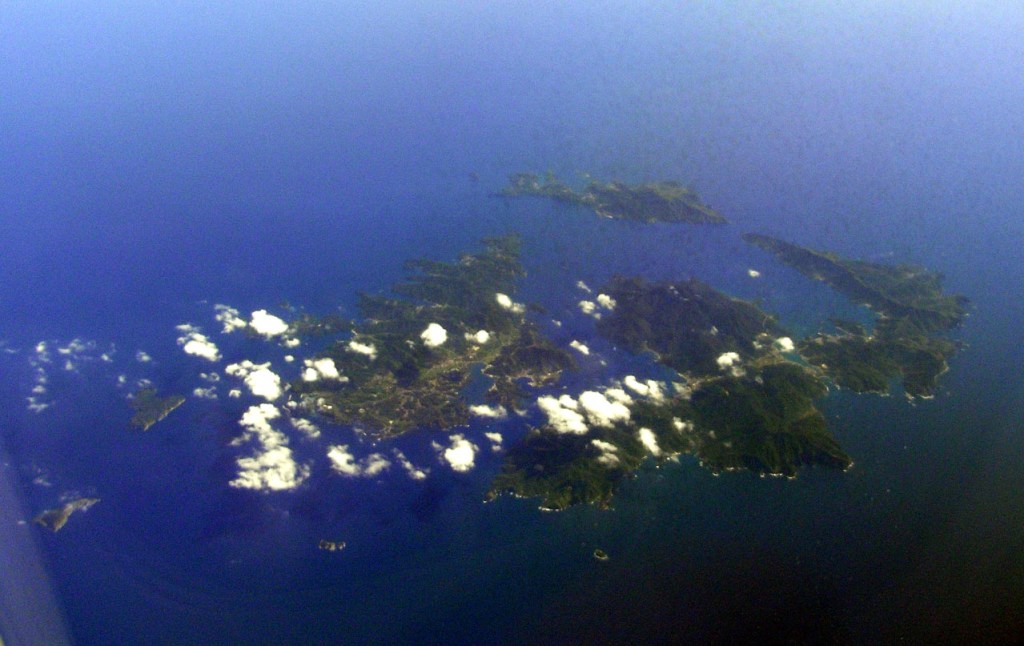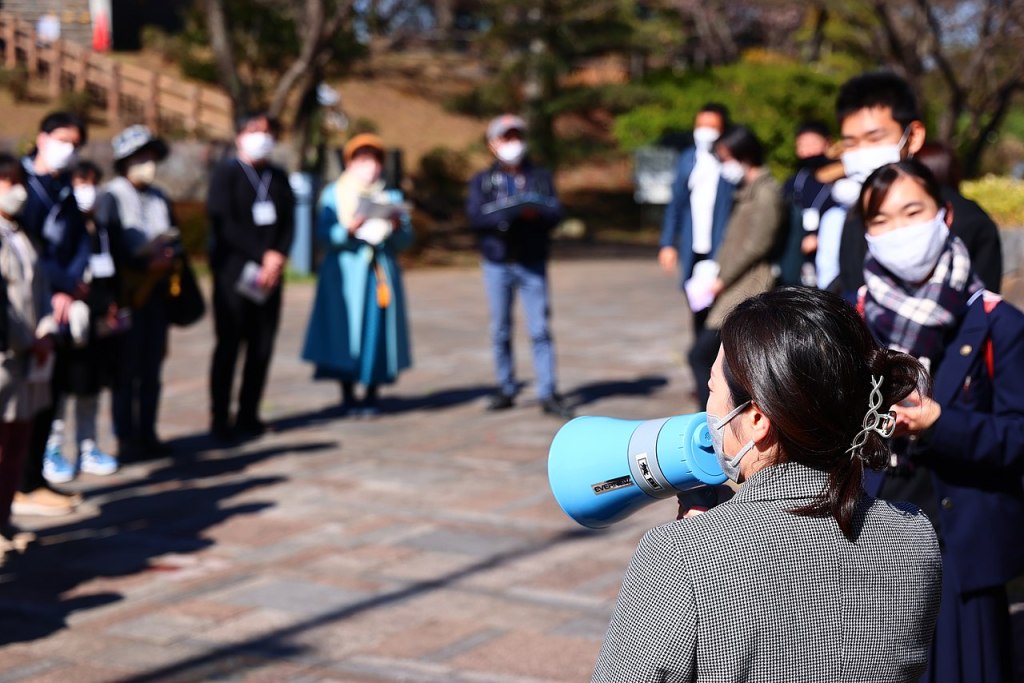In February 2023, the Glocal Inquiry Results Presentation was held at Saitama Omiya High School. Glocal Inquiry is a new form of education in Japan based on the acquisition of 21st century skills. Glocal Inquiry is a programme in which each student discovers local issues and thinks about what is needed to solve them. We have previously introduced an attempt by several high schools to hold a Wikipedia editing event at the same time, which is one of these initiatives.
How the programme started
A collaboration agreement between Saitama Prefecture and Shimane Prefecture led to the assignment of the teacher in charge, Rina Tanaka, to Shimane Prefectural Oki Dozen High School. The school is located in Ama town in the Oki Islands, 600 km from Tokyo, and defines the entire island as an educational field where various initiatives are being developed. Tanaka says: “I wanted to broaden my horizons by learning and thinking about what values and issues the people living on the island have in an environment surrounded by the sea.” The idea of Glocal Inquiry Learning stems from ‘trying to put a global perspective into a local perspective’.

File:20080720OkiDouzen.jpg on commons.wikimedia.org / Photo by BehBeh / CC-BY-SA-3.0
Around 20% of the population are I-turners, i.e. people who have chosen to move to another place other than their place of birth to work. In addition, the high schools themselves are working to make the islands more attractive, for example by actively accepting high school students to live away from their parents’ homes as ‘island study abroad’. At the same time, it is also working to increase the number of adults who stay on the islands, not only high school students but also adults.
She considered how she could return these studies in Shimane Prefecture to Saitama Prefecture, a bedroom town of Tokyo. As one such example, she planned fieldwork for students from Omiya High School to visit Ama in August 2022, but due to the impact of the spread of the new coronavirus infection, the programme was held in the form of an online exchange. At the briefing session for the online Glocal Exploration Programme, the students were given an explanation about the island by Ama Town Hall staff, and nine students eventually raised their hands. After the start of the programme, we also collaborated with Karuizawa in Nagano Prefecture and created an opportunity to learn about the history of Karuizawa, one of Japan’s leading summer resorts and tourist destinations, and how the town is being developed today.
In his opening address at the presentation, Katsuyuki Kamata, Principal of Omiya Prefectural High School, said: ‘The desire to put into practice the various initiatives implemented at Oki Dozen High School and other schools in Omiya led to the realisation of the project. After an internship at a publishing company, interviews at Karuizawa FM and an exploration of their own school’s history, today’s final presentation was held” and “In the process of thinking, they found issues and proceeded with their exploration. If the students themselves were able to search for and discover new questions, we consider it a success as far as education is concerned. In other words, I think that the repetition of questions and the discovery of challenges is exploration”.
Participating pupils’ thoughts and programme activities
Many of the pupils who took part in the programme were interested in ‘town planning’. After further questioning and dividing the themes of exploration for each individual, three groups were formed: ‘tourism’, ‘nature’ and ‘policy’. The Wikipedia Town held in 2022 at the Saitama Municipal Omiya Library was part of the glocal exploration. What is the history of the town where we live and study? The idea was to discover new things with their own eyes and to verbalise what they had discovered about their hometowns, whether it was true that they had said with their own mouths that they were ‘in the middle of nowhere’.
Each of the participating pupils identified a challenge and presented to the participants how they should work towards solving it. The following are the titles of each of these presentations.
- Tourism
- Commonalities and applications of tourist destinations
- Saitama Prefecture and tourist destinations
- Conditions in tourism for long-term migration
- Nature
- Links between nature and Hikawa Shrine
- Local cuisine
- Connection between nature and cuisine
- Policy
- Migrant jobs
- Town development
- Attractiveness plan
.jpg?resize=960%2C720)
File:グローカル探究最終報告会(2023.02.18).jpg on commons.wikimedia.org / Photo by Rina1121 / CC-BY-SA-4.0
One student in the policy team actually visited the municipal office where she lives to hear about what issues are currently being addressed in the policies she is working on, and to discover new issues from them. She focused on the cost of childcare because of the declining birth rate and ageing population in her municipality of residence, and the fact that her junior high school was set to close in four years’ time. As she spoke with city hall staff, she got a glimpse of the reality that despite various policies, they were not reaching the citizens at all. By actually visiting the city hall and listening to what they had to say, she discovered many things that she could act on.
Representative student feedback: Ms. Yumeka Araki
There were many opportunities for values and ideas to be shaken up in the course of many experiences. It was an opportunity to look at things I hadn’t thought about, to look at things I hadn’t paid attention to, to know more deeply. At the same time, I thought it was good to move on my own. It would be a waste to just end up researching the internet, and I want to make use of what I have researched. I want to continue to look into things I want to look into from now on.
Prepared critique
Finally, a general comment was made by a supervisor from the Saitama Prefectural Board of Education and a representative of the publishing company that hosted the programme’s interns.
General comment: Mr. Miki Kuwabara, guidance officer, High School Education and Guidance Division.
I think it’s unfortunate that we don’t notice things in our daily lives, for example, when we have an idea but don’t tell it to the people around us, or when we live our lives only by conforming. I think that by going to see someone in real life and listening to them, you could feel this. I think this programme was a good opportunity for people to experience that you don’t give up somewhere. Raising your antennae will change the way you look at things. There are many ways to fulfil the dreams you have at the moment. I think this will continue for the rest of your life, so I want you to explore a life of happiness.
Mr Kuwabara is responsible for providing guidance to schools and teachers on school education at the Saitama Prefectural Board of Education, which is the high school establishment.
General comment: Mr. Eiji Harada, Eiji Publishing Inc.
Exploration begins with what is familiar. What is important is not just thinking with the head, but what the heart feels, what the body feels, the thought of wholeness, 100% thinking. I would love you to turn what you feel with your body and heart into an original idea when you think about it again with your head. Creating and thinking without anyone teaching you is fun, I urge you to try it. Even if you find it somewhere else, I want you to make something beyond that.
I don’t want you to think with your head, I want you to feel with your heart/body.
Mr Harada is the head of a publishing company that publishes a number of business books in Japan.
Holding the next Edit-a-thon and beyond
The month after this presentation, on 19 March, Wikipedia Town in Kazo was held in Kazo City, where Saitama Prefectural Fudoka High School, which jointly hosted the previous Wikipedia Town, is located. More than 30 people involved, including not only students from both schools but also local residents and library staff, participated in the event and had a fruitful time editing articles on Kisai Castle.([[ja:騎西城]]) and other places and uploading photos to Wikimedia Commons.

File:Wikipedia Town Kazo vol.1 2023-03-19 (1) as.jpg on commons.wikimedia.org / Photo by Araisyohei / CC-BY-SA-3.0
One student remarked in her presentation of her impressions.
I wanted to absorb new things and to be able to cooperate with both schools. I was interested in the long shovel moat and the excavated items until the visit. I would like to continue this even if I actually go to university.
In Japan, March is the end of the school year; April is the new school year, when many students leave their alma maters, and teachers at prefectural high schools also change jobs. Activities for the next school year will be discussed in the future, but the company hopes to continue its activities.

Can you help us translate this article?
In order for this article to reach as many people as possible we would like your help. Can you translate this article to get the message out?
Start translation